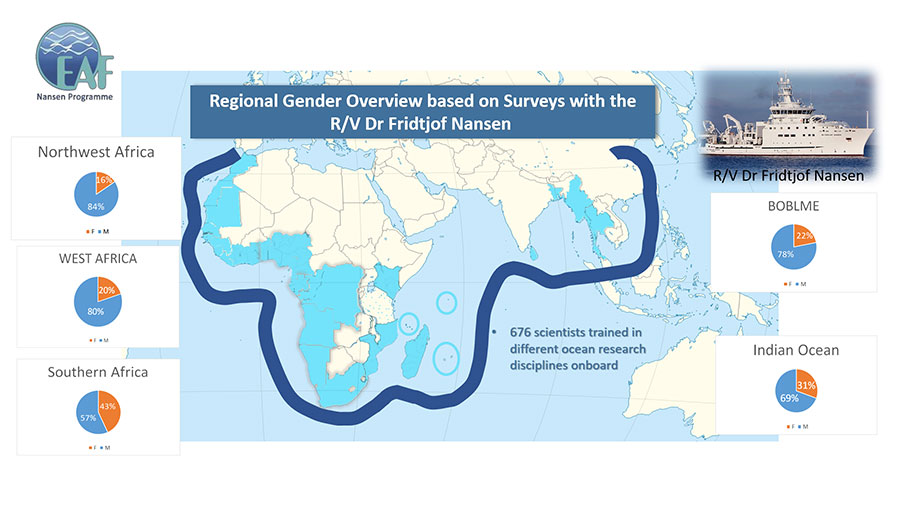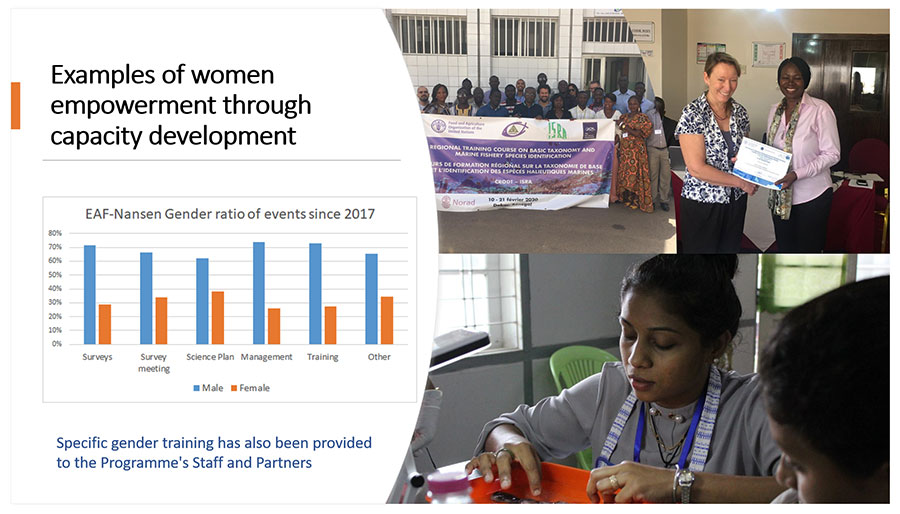EAF-Nansen Programme take part in identifying institutional opportunities and challenges for empowering women for the United Nations Decade of Ocean Science for Sustainable Development
How can we best advance the empowerment of women scientists for the UN Decade of Ocean Science and how can the gender-gap in maritime and ocean related industries be addressed and identified? This was the question that set the scene for the third workshop on Empowering Women for the UN Decade of Science for Sustainable Development, organized by the World Maritime University (WMU) on 28–30 September. A workshop at which Merete Tandstad, the Coordinator of the EAF-Nansen Programme, was one of the invited speakers.
The three-day, online workshop was designed to give the participants an opportunity to explore and discuss initiatives that are underway in, amongst others, selected multilateral organizations to promote gender equality. In particular, the empowerment of women in ocean affairs and in the conduct of ocean science in accordance with the sustainable development goal five (SDG5) – to achieve gender equality and empower all women and girls.
 |
|
Participants at the third workshop on Empowering Women for the UN Decade of Science for Sustainable |
The agenda included keynote addresses given by H.E. Helen Ågren, Sweden's Ambassador for the Ocean at the Ministry of Foreign Affairs, and Mr Ariel Hernán Troisi, President and IOC Chair of the Intergovernmental Oceanographic Commission of the United Nations Educational, Scientific and Cultural Organization (IOC-UNESCO), a presentation on gender theories by Professor Susan Buckingham, gender expert and external advisor at the WMU-Sasakawa Global Ocean Institute (WMU-GOI), as well as roundtable discussions consisting of presentations delivered by representatives from a wide range of international organizations and non-governmental organizations.
As an invited speaker to one of the roundtable discussions, Merete Tandstad contributed with a presentation focused on two aspects: the empowerment of women scientists in FAO (within the Fisheries Division), and the main impediments to achieving structural changes within the organization in order to deliver gender equality.
In addition to providing a summary of the current situation in the Fisheries Division at FAO – gender ratios, guidelines and strategies in place – and identified impediments – related to the nature of the work, decision-making processes, training opportunities and culture – Ms Tandstad shared experiences from the EAF-Nansen Programme and provided examples of how women can be empowered through capacity building activities.
 |
 |
|
Slides from Ms Tandstad’s presentation at the roundtable discussion. © FAO, pictures by Deborah Catena and Kwame Koranteng |
|
“Gender equality is an integral part of the EAF-Nansen Programme and we have a Gender Strategy that provides guidance on how to incorporate gender in all aspects of the management and delivery of our work”, said Ms Tandstad. “It is clear that there are challenges remaining to be addressed to ensure equal participation of women in our activities, but we are determined to use our platform and means to seek out tangible solutions that will continue to empower women in fisheries”, she continued.
This workshop initiative is part of series of activities carried out by a project that was established by the WMU in Malmö, Sweden that is founded by the International Maritime Organization (IMO), supported by the Fisheries and Ocean Canada (DFO) and delivered through the WMU-GOI. Having started in 2019, the project is aimed at investigating tools and pathways for increasing gender equality within which women are empowered in ocean sciences. The research outcomes arising from this project will inform the formulation of a Strategy Action Plan for Gender Empowerment in the Decade of Ocean Science for Sustainable Development.
Dr Cleopatra Doumbia-Henry, the President of the WMU, has stated: "To ensure readiness for future maritime innovation and ocean sustainability, gender equality, and the empowerment of women in maritime and ocean communities is critical".
Useful links:
- FAO Policy on Gender Equality. Attaining Food Security Goals in Agriculture and Rural Development (FAO Publication, available in all UN languages)
- The EAF-Nansen Gender Strategy (FAO Publication, available in English and French)
- WMU Workshop held on empowering women for the UN Decade of Ocean Science for Sustainable Development (WMU news article)
- Workshop flyer (WMU Publication)
For more information:
[email protected]
